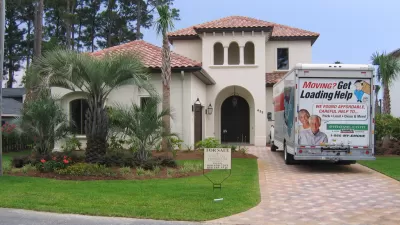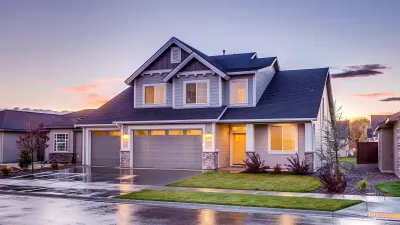Two articles look at millennials, cities, and the future. "Peak Millennial" refers to the numbers of millennials moving to and from cities. Grist's Ben Adler looks at why urban millennials are moving to suburbs, and what can be done to address it.

"Peak Millennial," described here last month, was coined by demographer and urban planner, Dowell Myers, Ph.D. of the University of Southern California. Natalie Delgadillo, editorial fellow at CityLab, writes that according to Myers, "from now on, there will be fewer young people moving into cities, because there will simply be fewer of them period...Additionally, as the largest group of Millennials grows older, many of them will begin to make the shift into suburban family life."
Ben Adler, who writes about climate change, energy, and cities for Grist, focuses on that last part—the urban out-migration of millennials, particularly for those starting families, to the suburbs.
"While it is a statistical fact that more Americans are still moving to the suburbs than to inner cities, it is a mistake to assume that means they all want to do so," writes Adler.
You've probably heard the narrative, backed up by census data: as millennials get older, they start families, and move to the suburbs in search of larger homes (and presumably the back yards), better schools, safer neighborhoods.
The truth is more complicated. Where people end up living is not necessarily where they want to live. If you look more closely, you will see that we’re pushing many people who would prefer walkable urbanism out to the suburbs against their will.
After all, he writes, "[i]f you ask young parents why they have left a star city for its suburbs, or for a cheaper Sun Belt region, you won’t hear most of them say 'because I wanted to shop at strip malls and big box stores' or 'because I love driving everywhere.'"
The other group Adler looks at are baby boomers, many of whom are returning, or hoping to return, to cities as empty nesters. Ironically, that could accelerate the millennial out-migration if cities don't build more housing to accommodate both generational groups.
"Ultimately, all cities should be trying to figure out how they can expand their housing supply, improve their schools, build up their transit systems, and develop other infrastructure to accommodate everyone — the young, the old, and even the middle-aged with families — who wants to live there," concludes Adler.
FULL STORY: Just because some millennials are moving to the ‘burbs doesn’t mean they like it

Maui's Vacation Rental Debate Turns Ugly
Verbal attacks, misinformation campaigns and fistfights plague a high-stakes debate to convert thousands of vacation rentals into long-term housing.

Planetizen Federal Action Tracker
A weekly monitor of how Trump’s orders and actions are impacting planners and planning in America.

San Francisco Suspends Traffic Calming Amidst Record Deaths
Citing “a challenging fiscal landscape,” the city will cease the program on the heels of 42 traffic deaths, including 24 pedestrians.

Defunct Pittsburgh Power Plant to Become Residential Tower
A decommissioned steam heat plant will be redeveloped into almost 100 affordable housing units.

Trump Prompts Restructuring of Transportation Research Board in “Unprecedented Overreach”
The TRB has eliminated more than half of its committees including those focused on climate, equity, and cities.

Amtrak Rolls Out New Orleans to Alabama “Mardi Gras” Train
The new service will operate morning and evening departures between Mobile and New Orleans.
Urban Design for Planners 1: Software Tools
This six-course series explores essential urban design concepts using open source software and equips planners with the tools they need to participate fully in the urban design process.
Planning for Universal Design
Learn the tools for implementing Universal Design in planning regulations.
Heyer Gruel & Associates PA
JM Goldson LLC
Custer County Colorado
City of Camden Redevelopment Agency
City of Astoria
Transportation Research & Education Center (TREC) at Portland State University
Jefferson Parish Government
Camden Redevelopment Agency
City of Claremont





























